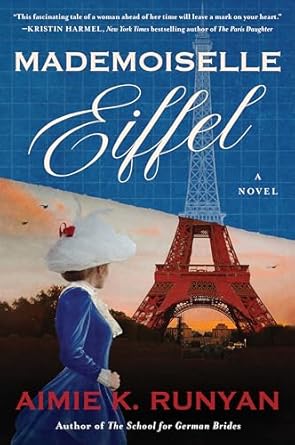Newsletters
Behind The Book Mademoiselle Eiffel by Aimie K. Runyan
New Information about Upcoming Book Related News
Behind The Book Mademoiselle Eiffel by Aimie K. Runyan
I am so delighted to be doing another Behind The Book Q&A with Aimie K. Runyan who has written several historical fiction novels. Last month I spent a week reading her new novel Mademoiselle Eiffel & of course fell in love with the story & historical period!
Q: Aimie, would you please give a brief description of Mademoiselle Eiffel? What made you want to write this specific story?
A: Mademoiselle Eiffel is the story of Claire Eiffel, the oldest daughter of the famous architect, Gustave Eiffel. Her mother died when Claire was only fourteen years old, and was left to not only raise her four younger siblings and run the household, but also to serve as her father’s right-hand woman and confidante in his business as well. I had wanted to set a story in the Belle Époque, as a sort of natural follow up to A Bakery in Paris to highlight how the city rebounded so beautifully in such a short time. When I came across a mention of Claire and all she’d done, it was a story I’d never heard of before and I knew I had to tell it.
Q: What was it like making two research visits to the Eiffel archives housed at the Musee d’Orsay? It sounds amazing! How long did it take you to research & write Mademoiselle Eiffel?
A: Researching in the Musée d’Orsay was incredible. I got to walk out through the grand gallery after closing the first day I was there and that experience, being alone in a place I’d only experienced with hordes of tourists, was something that will stay with me forever. Touching papers that Claire and Gustave Eiffel had handled or even composed themselves was magical. To look over a lifetime of correspondence was to get a window into Claire’s soul, and I just hope I did her justice. On two separate trips to Paris, I spent a total of four days in the archives (which was super generous on their part) and another three days in Paris visiting other sites such as the church where she was married, the exterior of several of her homes (none of which still exist, sadly) and of course, the Eiffel Tower itself. I also read a ton at home and found some great archival information online to pin down certain dates and details. The writing and editing process took just over a year.
Q: What lessons do you hope readers learn after reading Claire Eiffel’s story? What emotions do you want readers to feel after reading it?
A: Claire shows a lot of wisdom in this book. She sacrifices a great deal for her family without completely giving up her core self. I think we need to reclaim the idea that women who aren’t entirely selfless aren’t necessarily selfish. I believe that women can be incredibly devoted to their families without erasing themselves from the narrative of life altogether. Claire has been lost to history, but her accomplishments later in life (she won a medal of honor for her role in running a hospital in Switzerland in WWI, for example) shows that she didn’t just live to be a daughter, mother, and wife.
Q: If Claire had not become lady of the house, do you think she’d become an artist?
A: I think she would have given it a go, but it would have been a hard slog for any woman in France at the time, no matter how talented. But she had the Eiffel drive and determination (and family name and connections) so she would have had a better chance than most.
Q: I love the scene with Claire and her granddaughter Solange. You mentioned in the Authors Note Solange became a photographer. Would you ever write a book about Solange? I would read it!
A: Given that Solange’s immediate family may still be with us, I probably wouldn’t. And if any of them are reading this, I hope they appreciate that I tried to honor her memory and that of her amazing grandmother!
Q: For those who want to read more about Gustave Eiffel & the Eiffel Tower, which books would you recommend?
A: Believe it or not, there aren’t too many general non-fiction titles about him kicking around in English. Two of my favorites were Eiffel’s Tower by Jill Jonnes and Eiffel: The Genius Who Reinvented Himself by David Harvie. Both were indispensable as starting points for my research.

